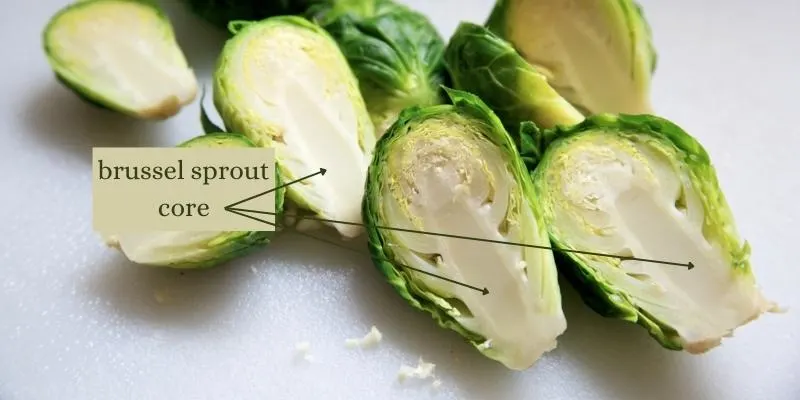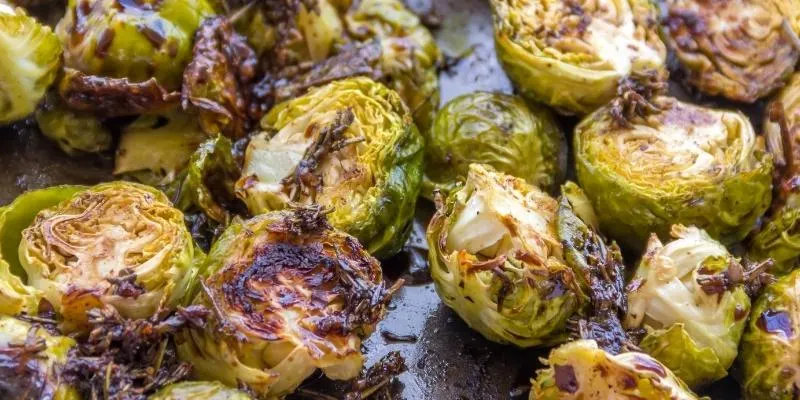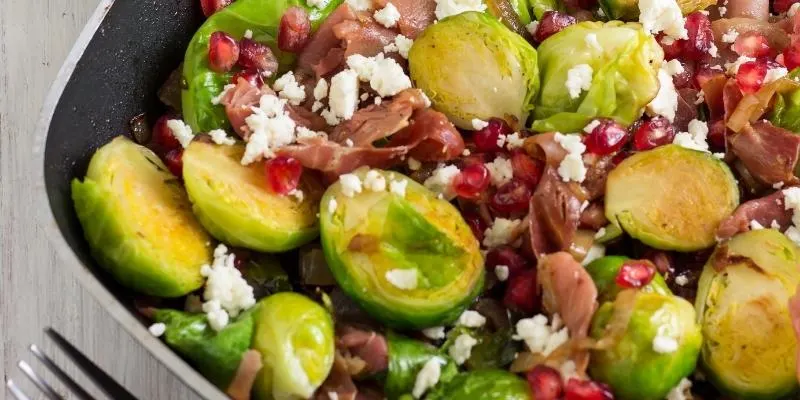Brussel sprout season is fast approaching and figuring out how to make it taste delicious is… a task. Why are brussel sprouts bitter, and what can you do to make them taste better ? Is it true that modern brussel sprouts are milder than the ones grown 100 years ago ? What do you pair brussel sprouts with ? Do you serve them as-is, or can you mix them with something ?
Why are brussel sprouts bitter ?
Brussel sprouts contain glucosinolate, which is a bitter compound naturally found in any Brassica family vegetables, including cabbage, broccoli, horseradish, mustard, cauliflower, asparagus, and so on. Brussel sprouts happen to have the highest amount of this compound, specifically in their stem and core. It’s a natural defense mechanism, and it is activated when the plant/vegetable takes damage, such as cutting it off the main plant, chopping it before cooking, slicing, and chewing (when raw).
So in short, brussel sprouts are bitter because their core contains a high amount of glucosinolate, their natural defense mechamism that turns the vegetable bitter to ward off any potential predator, including humans. Fortunately there is a way to remove the bitterness, especially since we now know where it’s located and why it’s bitter.
How to remove bitterness from brussel sprouts

Remove the center of your brussel sprouts to remove most of the bitterness (the core), like you would for a cabbage. Do this carefully, otherwise you’ll get loose leaves in your food and they get very soft very easily. This only works for fresh brussel sprouts, or for thawed brussel sprouts. It’s easier to do if the spouts are cut in half first.
Milder-tasting brussel sprouts – are they real ?
There is hope. It turns out that the brussel sprout industry is aware of the too-bitter sprouts and is actively working on producing and supplying milder versions of these vegetables. The main supplier of these milder sprouts is Syngenta, and they also offer classic (more bitter) sprouts. They only offer the seeds, so tracking which store and company sells brussel sprouts grown from these mild seeds is difficult. There are two varieties, a green and a red/purple one. The green mild variety is Cryptus, and the red/purple mild ones are Redarling.
How widespread are the milder brussel sprouts ? I don’t have a good estimate on that, but at least we know of a company that can offer milder sprouts. The company does have U.S. and U.K. presence so it might be safe to assume at least some of the sprouts on the market are mild ones.
Read also: Can You Reheat Cauliflower ? Can You Make It Ahead ?
How to make brussel sprouts taste better
Aside from removing the core, there are a couple of other things you can do to make your brussel sprouts taste better. They my not be for everyone, and some bitterness will still remain in the sprouts. But they will taste significantly better after removing most of the core. Pair that with any of the following tips, and you’ve got a really great side dish.
Add a cheese sauce or grated cheese to brussel sprouts
Regardless if the cooking method, cheese helps brussel sprouts immensely. Whether it’s a homemade cheese sauce, melted cheddar right on top of the veggies, sprinkled Parmesan, bubbly mozzarella right on top of each sprout, the result is the same. The milkfat in any sort of cheese will cover up most of the bitterness and the strong flavor of the brussel sprouts.
Of course, the more cheese you add the less you will taste the sprouts, so don’t overdo it. As for exactly what kind of cheese to use, it’s entirely your decision. If you’re adding the cheese at the end, it could be any melting cheese (aside from mozzarella) and it could also be a cheese sauce. If you’re roasting, a dollop of mozzarella halfway through is going to work very well.
Roast your brussel sprouts for better flavor
There are many ways to cook your brussel sprouts, including steaming, boiling, sauteeing, grilling, and roasting them. Out of all, roasting gives the best results in terms of masking any unpleasant taste. Always cut your sprouts in half if roasting (or grilling), and make sure to place them slice-down on the tray.
They will caramelize a little on the underside, and might even turn a bit crispy. Do not use olive oil for roasting anything ever, it burns before the food can cook because it has a low smoke point and turns everything bitter. Best to use your usual vegetable or cooking oil.

Add a bit of garlic to your brussel sprouts
Another option is to add some garlic into your brussel sprout recipe. How and when you add it depends on your tastes and whether you’re using fresh garlic or powder. Garlic powder is versatile and ca be added at any point, but I recommend:
- adding it halfway through of roasting
- adding it at the end or in a sauce if grilling, boiling, steaming, or frying
If you’re using fresh garlic, the best method is to crush it. This way you’re getting the delicious flavor from the garlic oil, and you’re also getting some spiciness. This works well if you’re steaming or very lightly grilling the garlic. If grilling add the garlic paste right at the end, in the last 30 seconds. Or use the garlic in a sauce or marinade.
Read also: Why Is Cabbage Bitter? Is It Safe To Eat?

What foods go with brussel sprouts ?
Brussel sprouts are a holiday and cold season staple, so they will go very well with most cold season items like cured meats, pecans, maple syrup, honey, pumpkin, most roasts (poultry or otherwise), and a long list of root vegetables. Some of the best brussel sprout combinations for a side dish are:
- brussel sprouts with sweet potato and pecans, with a spicy-garlic glaze
- brussel sprouts with baby carrots, tossed in butter after they’re done cooking
- roast brussel sprouts with crispy bacon on the same tray
- steamed brussel sprouts with boiled potatoes, tossed in a mayo-mustard dressing
Of course, brussel sprouts can also be added to a warm salad, like a warm potato and roast brussel sprout salad, with a bit of crispy bacon and either maple syrup or just a dash of sugar.
In the end you can pair your brussel sprouts with whatever food item you think works best. Just don’t worry too much over it, since it goes well enough with most cold season flavors. As long as you remove most of the core, the bitterness should be far more tolerable. Unless you’re a kid, in which case brussel sprouts are your sworn enemy and they better not show their ugly green faces, or else.

